Table of Contents
- What you need to know this week
- Things I found interesting this week
- Interesting new SERP features or tests
- My new traffic drop assessment tool is coming!
- Podcast / YouTube
- The latest important info on AI and ChatGPT
- Other interesting news and stories
- Important for local businesses
- SEO Jobs
Search News You Can Use Episode 267 - The latest on the Helpful content and link spam updates, info on my new tool and more (December 30, 2022)
Remember when I said there may not be a newsletter this week because of the holiday? Haha…just kidding.
This week I have been enjoying a quiet Christmas with my family. I wasn’t sure whether I was going to take the week off. On Tuesday I thought I’d sit down to play with using ChatGPT as an assistant to help me try once again to create a tool to help people assess traffic drops. I’ve been trying to do this for 10 years, but have never come close to the dream that is in my head.
Well, it’s working! I’ll share more on my progress in this issue.
The latest on the helpful content and link spam updates
Both of these updates are still rolling out.
John Mueller said we likely will not see an update for a “bit longer” because Google tries to reduce the amount of change in their systems for safety reasons.
Looks like we will need to wait later for the helpful content and link spam updates to be complete. pic.twitter.com/zGRDURTLwh
— Marie Haynes (@Marie_Haynes) December 28, 2022
I have heard many people speculating that the link spam update has caused them significant losses in rankings and traffic. I have not yet investigated myself yet. I want to wait until the updates are finished rolling out.
As I analyze sites that were hit, I’ll be running them through my new tool. If your traffic is down and you can’t figure out why, you can submit your site here. If I use it in my study, I’ll send you a copy of your report or a link to use my tool when it is ready.
I’ll update more in future episodes. Analyzing these updates is going to be very interesting!
Here are some recent community tweets:
Examples of health sites seeing a decline. One commonality between the three is a lot of HARO links w/ not much else. Coincidence? HARO is a great way to network and raise brand awareness but not the sole strategy for building links b/c it’s exploitable, IMO. cc:@Marie_Haynes pic.twitter.com/1Z15hbDz35
— Vlad Rappoport (@vladrpt) December 27, 2022
Some more examples of sites dropping based on the December Link Spam Update. These include porn, website design, and finance/loans. And check my tweets from yesterday for other examples. Some sites lost a ton of visibility. And many of the links are super-unnatural. Penguin-like: pic.twitter.com/QNRS3KjAQS
— Glenn Gabe (@glenngabe) December 19, 2022
I briefly opened my analytics and saw a number of sites with wild changes.
I'll report on what I've seen the industry is seeing in newsletter this week.
But not doing any analysis till these updates are done.
— Marie Haynes (@Marie_Haynes) December 28, 2022
It’s worth keeping in mind that if your traffic and rankings are down this week, that could just be normal seasonal change!
Rankings will often change because user intent changes at Christmas.
From my guide to assessing traffic drops: pic.twitter.com/6v8ofx6FRB
— Marie Haynes (@Marie_Haynes) December 27, 2022
I updated my article on the December Helpful Content Update with everything we know so far and more of my thoughts. It’s worth a re-read even if you were not hit.
Updated my post on the December HCU with what we know so far and my thoughts on what I've seen. https://t.co/T7xa6eMCbm
Won't be fully analyzing till it's done tho!
— Marie Haynes (@Marie_Haynes) December 29, 2022
Q&A:Is engagement a ranking factor?
I love discussions like this.
However, I emailed it to the list yesterday and had a really good engagement with the page.
✅ High average time on page
✅ Low bounce rate
✅ Some shares/engagementAnd most of the users were Chrome users. pic.twitter.com/n9J9Gg7LbI
— Gael Breton (@GaelBreton) December 30, 2022
Gael published a blog post that he says was “comically unoptimized” and it quickly started ranking at #2. Not bad!
He is wondering whether user engagement could have improved these rankings. Gael had sent this article out to his email list and many had legitimately engaged with it. Does Google recognize and reward that via Chrome? Or, he wondered if perhaps this post might have ranked due to Google rewarding freshness.
Here’s what Google’ says about their freshness ranking system:

It is possible that freshness matters here, although given this is a relatively new product that is being reviewed, I would expect that all articles would be considered fresh enough to rank. I could be wrong though. Freshness is not a system I’ve studied much.
The next question is whether Google uses data from Chrome to determine which sites people engage with. I believe they do, in a few ways.
Immediate user engagement
I’ve mentioned in the past about Rand Fishkin’s Mozcon experiment where the whole audience searched, clicked on and engaged with one particular website and sure enough, the website improved in rankings for that search.
Also, when MHC won the Wix SEO competition a few years ago, we believe part of the reason was because we manipulated user behavior! We asked our newsletter subscribers and my Twitter followers to search for “Wix SEO” (the term we were trying to rank for), and click around our site to find which pages we had hidden pictures of John Mueller on! It was a tight race, but the following day when the contest was judged, our rankings improved just enough for us to win!
Click behavior does seem to affect rankings. However, in both of the above cases, the ranking improvements reverted back within a day or two.
If Gael’s good rankings are due to increased engagement, the increase may be short lived.
How Google may use Chrome engagement signals
I suspect Google likely does gather data from Chrome for some websites. Which content is engaging people? What is getting shared? What are people clicking on? These are all metrics that could correlate with site quality or helpfulness. The problem though is that it’s a noisy metric. If Google relied heavily on clicks and engagement as a ranking factor, people would set up click farms and fake engagement bots. People have tried it with minimal success from what I’ve heard.
What I believe Google does is use a subset of this data for training purposes. We’ve talked in the past about how machine learning algorithms work by labelling examples of good and bad pages. They can then determine what types of things are consistently correlated with high or low quality content and build algorithms to reward that type of thing for all searches similar searches.
For example, perhaps for certain queries, content that has unique images consistently gets better engagement. If that’s the case, then for future searches of that query or ones with similar intent, Google may make unique imagery a more heavily weighted ranking factor.
So why is this page ranking?
Personally, I think Gael’s page is ranking well because it’s good and helpful! This is a product review article and it ticks off a good number of the boxes in Google’s criteria for good product reviews.
It:
- evaluates the product from a user’s perspective
- demonstrates knowledge and experience
- explains what sets the product apart from competitors
- discusses benefits and drawbacks based on research
That research one is important. Google says they want to reward content that provides original information, reporting, research or analysis. This content delivers.
On top of that, a quick look at the About this result information for Gael’s website shows me he’s built up some reputation (i.e. E-E-A-T signals) in the industry.
This appears to be content that has E-E-A-T and has several aspects that are consistent with what Google says they want to reward.
I wish I could spend more time analyzing this but this newsletter has got to get out! (I’ve just spent two hours fighting with WordPress. Gah!)
Discussed in this episode (for paid members):
- Thoughts on optimizing for neural matching
- Discussion on Jeannie Hill’s article on the latest QRG changes, especially experience
- Explore is seen more often now and is likely stealing clicks from you
- The latest important information to know on AI and ChatGPT
- A whole bunch of other information I found interesting and helpful this week on passage ranking, a recap of this year’s Google updates and more discussion on whether links have less impact for helping sites rank as in the past.
Things I found interesting this week
Thoughts on optimizing for neural matching.
This was a very interesting conversation with Kevin Indig.
In a recent Q&A from the Blueprint community, I was asked how I would factor in Neural Matching and entities when optimizing for search engines.
Here is my answer. pic.twitter.com/3VACdb7wMH
— Kevin_Indig (@Kevin_Indig) December 28, 2022
He shares how if someone searches for “performance marketing”, Google knows which entities are related to that topic, like for example, “advertising”.
Next, Kevin demonstrates how he uses Google’s NLP (Natural Language Processing) tool to assess content and determine which entities are discussed in the content. You can then compare the salience score of your content for important entities to your competitors.
It makes sense to me that content that can be understood by NLP is more likely to rank well.
You can play with Google’s NLP tool by inserting your own content into it. I’ve played around with using this for years and have felt there are things we can learn from looking at salience scores. But I haven’t thoroughly tested it. With that said, I will be spending more time in the future playing with this.
Kevin says that this produces similar results to many of the SEO content writing tools that often rely on tf-idf. He does not feel that Google uses tf-idf currently, but he says that optimizing content in this way tends to work well in Google’s NLP driven algorithms.
I do have to differ with Kevin on one particular point. He sys that Google did not once mention E-A-T in their new search systems guide. The helpful content system documentation links to information on creating content that the helpful content system is designed to find helpful. They give us questions to use to self assess our site such as “Is this content written by an expert or enthusiast who demonstrably knows the topic well?” or “Does your content clearly demonstrate first-hand expertise and a depth of knowledge (for example, expertise that comes from having actually used a product or service, or visiting a place)?”, questions clearly related to E-A-T. They end this document with information telling us how important E-A-T is.
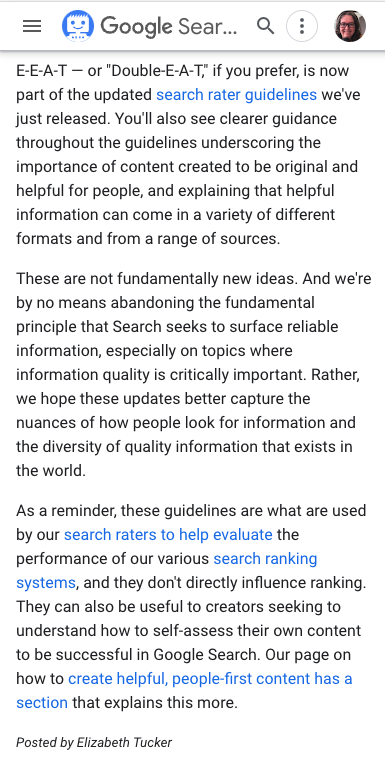
I won’t reopen the dated, Is E-A-T a ranking factor argument again. Is it a line in Google’s algorithms? No? It is not a single ranking factor, but is most definitely considered in every single query searched on Google.
Jeannie Hill’s thoughts on the latest QRG changes
I cannot believe I have not yet fully reviewed the changes to the QRG. Thankfully Jeannie has made a great summary for us!
My favourite parts:
- “The addition of “experience” underscores that content quality should also assess the extent to which the content creator has first-hand experience to support the article’s topic.”
- Jeannie talks about how author related mentions like “content creator” or “journalist” or “author” are all over the QRG. I’m with her in thinking that Google wants to recognize people as entities whether they are well known authors or simply hobbyists sharing their craft.
- The QRG says 6 times how important it is for your content to perform well on mobile.
I’d recommend giving this article a read!
Interesting new SERP features or tests
Is Explore stealing clicks from you?
I am seeing more and more Explore results in my Google searches. It used to be that I could occasionally trigger Explore for some searches by scrolling for several pages. This week, I am often seeing Explore take up the first several scrolls.
The first result had exactly what I was looking for… Info to confirm Allgeier was a good addition to my roster.
No need for me to visit any other sites. pic.twitter.com/QHVmOSTjI9
— Marie Haynes (@Marie_Haynes) December 28, 2022
“Things to know” in the right sidebar
This is apparently not new (thanks Barry), but I have not seen it before. Nick caught a glimpse of a search result where a Things to Know feature was present in the right side bar.
It would not surprise me if we see more and more things appear in the sidebar. Google will likely train us to use AI powered search features alongside traditional search.
Interesting. I never noticed until today that Google served "Things to know" snippets in the right rail on desktop. pic.twitter.com/Zdt6RboEnS
— Nick LeRoy (@NickLeRoy) December 23, 2022
My new traffic drop assessment tool is coming!
I’ve got a new tool coming to help you assess traffic drops!
I have been trying for ten years now to build a tool to automate my process in assessing traffic drops. It turns out it’s not that easy to do! Or perhaps I just haven’t talked to the right people.
I’ve hired and had conversations with so many developers and SEO’s to discuss this, but it’s always been an expensive side project that never got near to completion or close to being as accurate as I wanted. Every couple of years I pick up the project again and give it another go.
This week I spent a day using ChatGPT as my assistant to help me once again try and build the tool. And um…I got it to work! ChatGPT wrote some scripts for me. Some did not work, some took some tweaking, but ultimately my tool started to do what I wanted it to do. After an entire day of tweaking formulas and trying different scripts and calculations I was near tears when I realized that the tool was accurately picking up traffic drops that I would have diagnosed as Google update hits and was generating my recommended list of resources for recovery.
I’m currently testing it on sites that have been submitted to me that have seen declines with recent updates.
I am not sure how long it will take me to complete this tool. There is more to be done and I’m so excited to do it! When it is ready for the public, I will likely open it up to paid newsletter subscribers to beta test it. And then eventually I plan to make it free for everyone to use.
And wait till you see what phase two of the tool will be!!! It is very exciting!
Podcast / YouTube
Normally this would be a podcast week. I’ve been so busy with the holiday and building my tool that it did not happen this week. If you missed it, here is last week’s episode to help you assess December traffic drops. Even if you didn’t have a traffic drop, there’s a lot to be learned in this episode.
I also had fun doing two livestreams this week where I opened up the QRG and reviewed the new changes. There are a lot!
In this one I shared a bit about how I use ChatGPT as an assistant, while dissecting the new QRG changes.
The latest important info on AI and ChatGOT
The latest important info on AI and ChatGPT
Last week I shared some gloomy thoughts on how I believe that AI based chat will radically change our world…and likely very quickly.
I am not an expert on AI chat but I am learning. I think it is important for us as advisors and the people who business owners look to for advice to understand as much as we can about how AI is changing the digital landscape.
I'm not one bit worried for Google.
But I am worried for the millions of websites that soon will not be necessary anymore because they're just regurgitating information that will eventually be answered with AI chat. 😬
— Marie Haynes (@Marie_Haynes) December 30, 2022
The coming wave of disinformation
I have no doubt that AI based chat is going to completely disrupt Search as we know it. If Google does not implement it alongside search, Bing will. I have seen several examples of new search engines that are using it. Last week I shared a chrome extension that you can use to add OpenAI chat alongside your search results.
I want to tell you how making scalloped potatoes made me both excited and terrified about AI.
On Christmas day, David asked if I could make scalloped potatoes. Sure. I have made them many times before. I don’t have a favourite recipe. What I usually do is look up a base recipe and then tweak it to make it gooooood.
So, I asked ChatGPT for a recipe.
I changed the recipe tho. It needed more spices. Plus I had to do several layers of potatoes. Also, I had to bake it for much longer than 30-35 minutes – more like double that. It turned out amazing.
I could say:
AI sucks. It was inaccurate.
but really,
I'll use this again.
— Marie Haynes (@Marie_Haynes) December 27, 2022
If I messed up the recipe, the worst that happens here is we have yucky potatoes. (They were amazing by the way.)
But what If I’m doing a search for a medical treatment, a research paper, or a new skill I’m learning and it’s slightly off?
The concern I have over AI chat is that when it’s wrong, it’s convincingly wrong. Remember when John Mueller and Barry Schwartz argued over cheese being a ranking factor?
Here's @JohnMu and @rustybrick arguing over whether cheese is a ranking factor. pic.twitter.com/D2vvrBL3FT
— Marie Haynes (@Marie_Haynes) December 3, 2022
There is often no way to know that the answer you are getting is not completely accurate.
OpenAI discusses this in their 2021 article about WebGPT which shows that references can be inserted into the answers given.
I believe that Google is our best hope when it comes to fighting the waves of disinformation that are likely to be created with widespread use of AI chat tools.
How Google can help fight against the coming wave of disinformation?
Here’s a thought I had this week. What if has Google seen the AI disinformation age coming for several years now? This document on how Google fights disinformation makes a lot more sense now. At the time of publishing, I wondered what specific disinformation Google was referring to. I had wondered if this was in regards to keeping the internet safe in terms of bad actors trying to publish snake oil or miracle cures. That may be part of it. But now I think they saw AI chat coming.
Here are a few excerpts I found interesting.
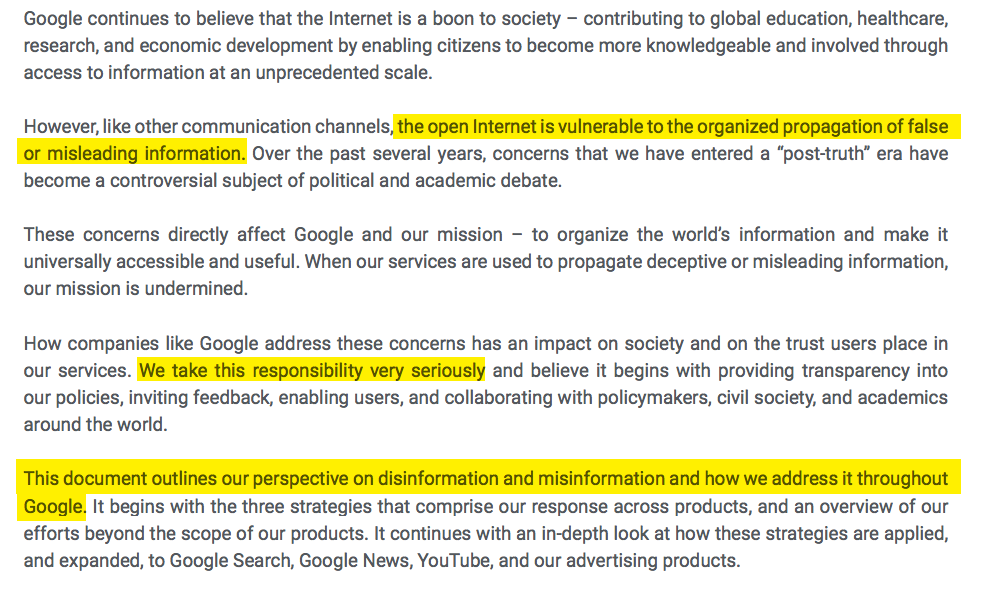

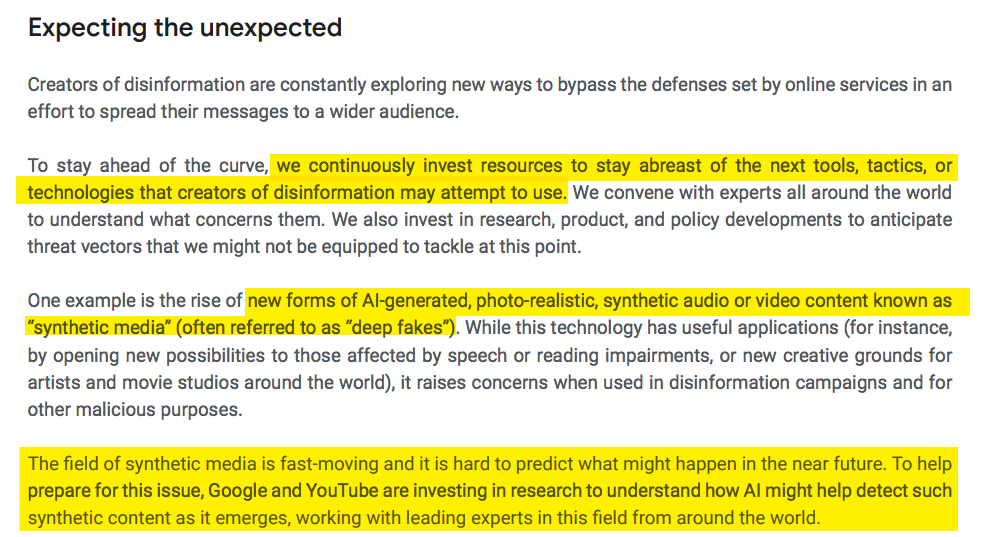



Google tells us in this document what one of their main weapons is against fighting disinformation. This was the first mention outside of the QRG of the concept of E-A-T: Expertise, Authoritativeness and Trustworthiness being approximated by Google focusing on measurable signals. E-A-T, now E-E-A-T is Google’s weapon to fight against disinformation!
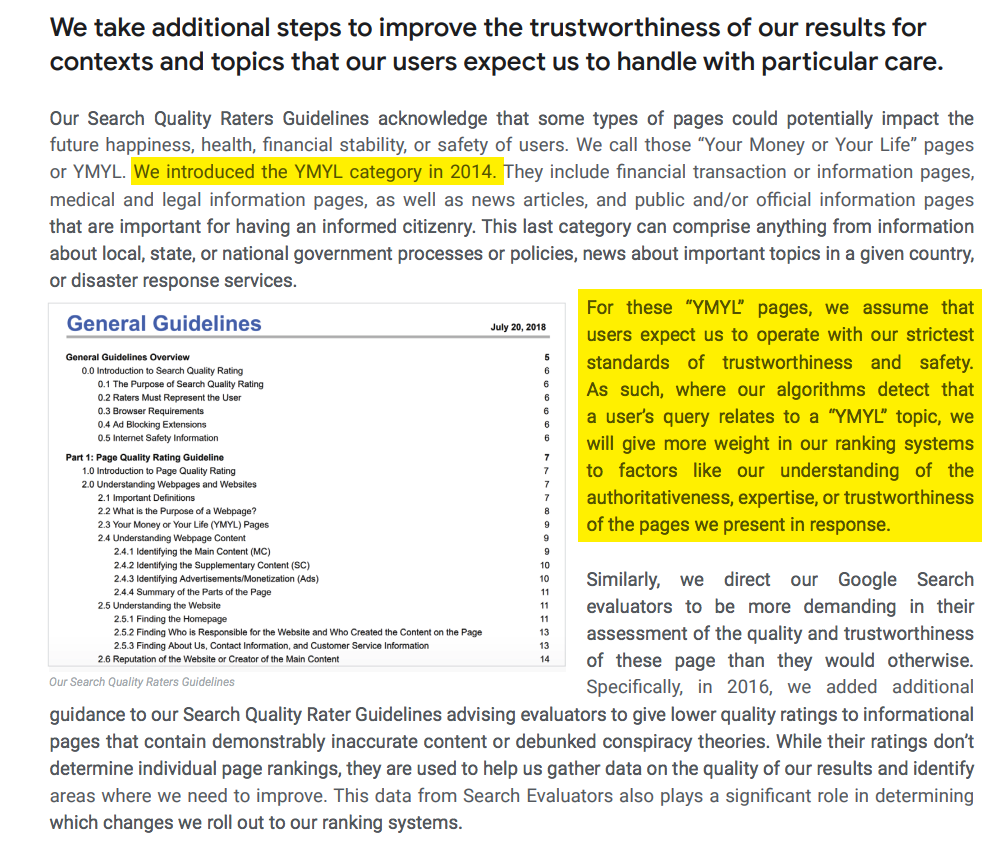
It’s no coincidence that Google’s announcement about the extra E in E-E-A-T, Experience happened at the same time the world came to hear of the power of AI chat.
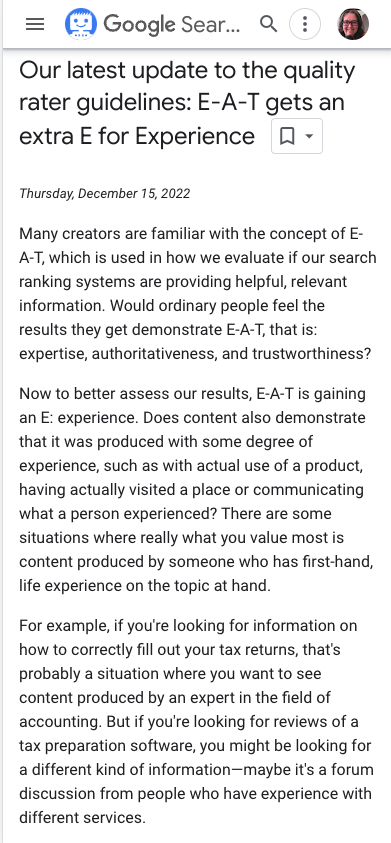
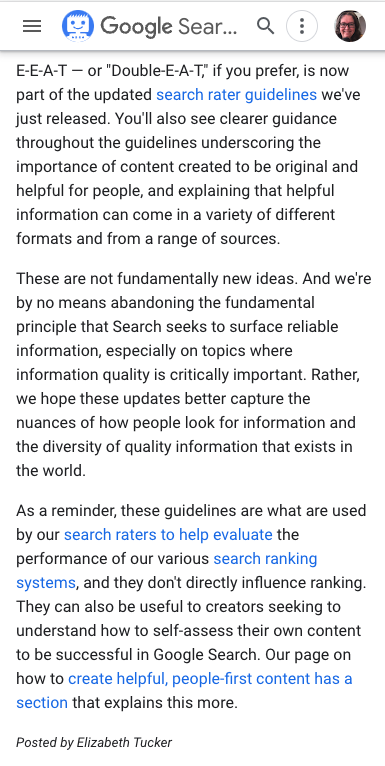
We will be discussing Experience a LOT in the weeks to come. As I study sites hit by recent updates, I’ll be looking in great detail as to whether Google seems to be rewarding more sites demonstrating experience. Or perhaps this is something we will see with the next core update?
Funny story:
I saw a tweet about Mercury being in retrograde soon and had no idea what that meant so did a search to find out.
How weird is it that the last two Google core updates happened while mercury was in retrograde?
Or maybe it's not weird after all?🧐 pic.twitter.com/esyANuOFSC
— Marie Haynes (@Marie_Haynes) December 28, 2022
Michelle Bourbonniere shared this great tweet with me that Bill Slawski had been discussing a while back. If you’re interested in reading more about how Google can fight disinformation check out this patent that talks about how AI language models “are prone to hallucinating, and crucially they are incapable of justifying their utterances by referring to supporting documents in the corpus they were trained over.” The answer, the paper says, is in recognizing who the domain experts are.
This Google patent proposes using classical information retrieval *and* pre-trained language models (think Google's version of GPTChat) to create systems that offer expert advice & justify responses with supporting documents for more reliable, in-depth answers to info needs.🤯 https://t.co/Y20CKx7xG9
— Marie Haynes (@Marie_Haynes) December 24, 2022
Can AI detection tools detect ChatGPT?
This was an interesting thread:
Test #1: Straight Up Copy & Paste AI Content 🤖
Prompt "write a short article about 5 affiliate marketing mistakes"
This was the easiest test, and the tool aced it. I repeated it several times, and each time it caught it.
It's safe to say it will catch the most basic prompts. pic.twitter.com/RVmDQrUCFK
— Gael Breton (@GaelBreton) December 28, 2022
Gael used a tool called originality.ai to check whether AI written content was detectable. This is the post I discussed in the Q&A section above. I know it is helpful content because I had already written this up for newsletter before adding the Q&A.
In Gael’s test, content that was written by Jasper and human edited was detected as 18% original and 82% AI.
Truly human written content was detected as 98% original.
He pasted a Brian Dean article into ChatGPT and asked it to write “an article about another SEO tactic in the same style”. This, despite being written by AI, was detected as 91% original.
But then he asked ChatGPT to simply, “write an article about 5 affiliate marketing tips” and it was detected as 100% AI written.
I think it’s really interesting to see these results. But, it is important to know that Google is not against AI generated content. They’re against low quality, unoriginal, uninspiring content. The thing is, most AI generated content fits that bill.
We haven't said AI content is bad. We've said, pretty clearly, content written primarily for search engines rather than humans is the issue. That's what we're focused on. If someone fires up 100 humans to write content just to rank, or fires up a spinner, or a AI, same issue…
— Danny Sullivan (@dannysullivan) November 7, 2022
You can use AI to help you write great content. But to succeed you likely will need to add originality that doesn’t already exist on the web. One of the best ways to do this is by demonstrating your experience!
Other interesting AI news and information
I once researched which language model Youchat is based on. It could be Google's BERT. But you can also find information that talks about a self-trained language model. pic.twitter.com/aac1sqDzwj
— ✌️Oᒪᗩᖴ KOᑭᑭ 🔥 (@Olaf_Kopp) December 28, 2022
Delighted to share our new @GoogleHealth @GoogleAI @Deepmind paper at the intersection of LLMs + health.
Our LLMs building on Flan-PaLM reach SOTA on multiple medical question answering datasets including 67.6% on MedQA USMLE (+17% over prior work).https://t.co/jZZuFDrxGw pic.twitter.com/8k7qO6wTZw
— Vivek Natarajan (@vivnat) December 27, 2022
My friend @YoungbloodJoe's put together a killer list of 17 ways to use #ChatGPT for #SEO, and even included how effective they were + transcript examples! 🤯👇
🔗 https://t.co/H1SSYaULEN pic.twitter.com/fWtPB0WxTu
— DataChazGPT (not a bot) (@DataChaz) December 23, 2022
A neat #ChatGPT tip for designers from @faridsabitov!
Ask it to generate an SVG icon + copy and paste it directly to @figma 🤯🤯🤯 pic.twitter.com/ViwL0Bt45L
— DataChazGPT (not a bot) (@DataChaz) December 22, 2022
This was still above my skill level so I asked it to explain like I'm 5.
Still more than a 5 year old could grasp most likely, but this really helped me…thinking of attention in neural networks like working on a puzzle and only paying attention to a few pieces at a time. pic.twitter.com/gL7Olsb2R6
— Marie Haynes (@Marie_Haynes) December 27, 2022
I asked ChatGPT to create an online calculator and give me the code to embed on my website. It could do a very basic version and it worked! Wasn’t able to get a functioning one with more complicated inputs but the potential of this tool still wows me!
— Alicia Gilbert-Marshall ✨SEO (@thealiciamars) December 27, 2022
I just used it to create a complex spreadsheet formula, one that would have taken be a couple hours of messing around to do on my own. Took ChatGPT 30 seconds. And it worked flawlessly.
— Mark (@slobizman) December 24, 2022
I've been enjoying open ended questions to complex situations. The answer isn't particularly a 1-step solution, so it usually gives me 3-5 options. A lot of them are canned but it actually jogs my brain on 1. Queue – "oh I didn't think of that, good idea"
— Josh Hutcheson ⛳️ (@Hutch_Josh) December 27, 2022
https://twitter.com/brianwhite/status/1606661337173884928?s=20&t=1zkH681CkXA14p4pHuKC9w
Other interesting news and stories
This was an interesting read about passage ranking:
Reminder: Google's passaging ranking (not indexing) is about helping Google better understand messy content https://t.co/ufiGZvYPN9 pic.twitter.com/z5IGqE1XOS
— Barry Schwartz (@rustybrick) December 28, 2022
Google first announced passage ranking technology in October of 2020.
With our new technology, we’ll be able to better identify and understand key passages on a web page. This will help us surface content that might otherwise not be seen as relevant when considering a page only as a whole….
— Google SearchLiaison (@searchliaison) October 20, 2020
Their blog post describing passages says, “We’ve recently made a breakthrough in ranking and are now able to better understand the relevancy of specific passages. By understanding passages in addition to the relevancy of the overall page, we can find that needle-in-a-haystack information you’re looking for.”
I think it’s interesting that this same blog post tells us about advances Google has made in understanding subtopics: “As an example, if you search for “home exercise equipment,” we can now understand relevant subtopics, such as budget equipment, premium picks, or small space ideas, and show a wider range of content for you on the search results page. We’ll start rolling this out by the end of this year.”
Google is getting better at finding good helpful content on pages, even if the pages aren’t properly SEO’d or well structured with headings.
Here’s a good recap on this year’s updates and Google news:
Google algorithm updates 2022 in review: Core updates, product reviews, helpful content updates, spam updates and beyond via @rustybrick https://t.co/dZG7zPuGLm pic.twitter.com/UTmNIblEFK
— Search Engine Land (@sengineland) December 27, 2022
More discussion on whether links have less impact for helping sites rank than in the past.
Google on Less Link Power
Google remarked that links have "a lot less significant impact" today than they previously did in the past"
https://t.co/t7TrZqg5ib via @martinibuster, @sejournal— Debi Norton (@BRAVOMedia1) December 24, 2022
Helpful for local businesses
Does click-through rate alter the order of reviews on Google?🤔 https://t.co/cZdeGPBh35 pic.twitter.com/GKck48NcmT
— Joy Hawkins (@JoyanneHawkins) December 27, 2022
Sterling Sky did a test where they got a bunch of people to click on reviews to see if they could possibly move those reviews up in the order they are displayed.
And…”the review did not move!”
Cancel your plans to create click farms!
If you run a WordPress site and use the stop spammers security WordPress plugin, be aware:
WordPress Anti-Spam Plugin Vulnerability Affects Up To 60,000+ Sites via @sejournal, @martinibuster https://t.co/k1e3Y7UwXy pic.twitter.com/nLjXCiQjXW
— Ian Booth – SEO (@IBdigi) December 27, 2022
Are you noticing that your local packs are appearing lower down in the SERPS now?
Been noticing that too. Even seeing them below page 1 as well.
— Ryan Mews 🤓 SEO (@RyanMews) December 23, 2022
A good tip from Colan!
Ever notice how the ordering of the filters at the top of the SERP change based on the query? Use this to understand what Google thinks the intent of the query is. If "Shopping" is first, this tells you the query has purchase intent. Maybe an ebook is in order. pic.twitter.com/IL92lh0V35
— Colan Nielsen (@ColanNielsen) December 29, 2022
SEO Jobs
Looking for a new SEO job? SEOjobs.com is a job board curated by real SEOs for SEOs. Take a look at five of the hottest SEO job listing this week (below) and sign up for the weekly job listing email only available at SEOjobs.com.
- Head of SEO ~ Policygenius ~ $160K-$240K ~ Remote
- E-Commerce SEO & Marketing Lead ~ John Deere ~ Remote
- Content & SEO Strategist ~ ReviewTrackers ~ Remote
- Organic SEO Director ~ Rise at Seven ~ $120-170K ~ Remote option
- SEO Content Strategist ~ Wix ~ $80k-$110k ~ Remote Hybrid, NYC
I’m really looking forward to seeing how the link spam and helpful content updates pan out. As I assess sites hit, I’ll be developing my tool alongside. I am SO excited!
I hope you are having a wonderful holiday! (if it is one for you.)
See you next year!
Marie




